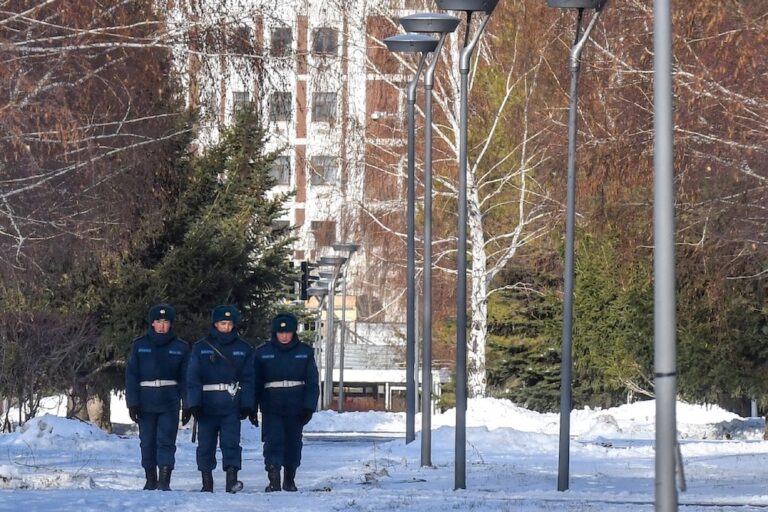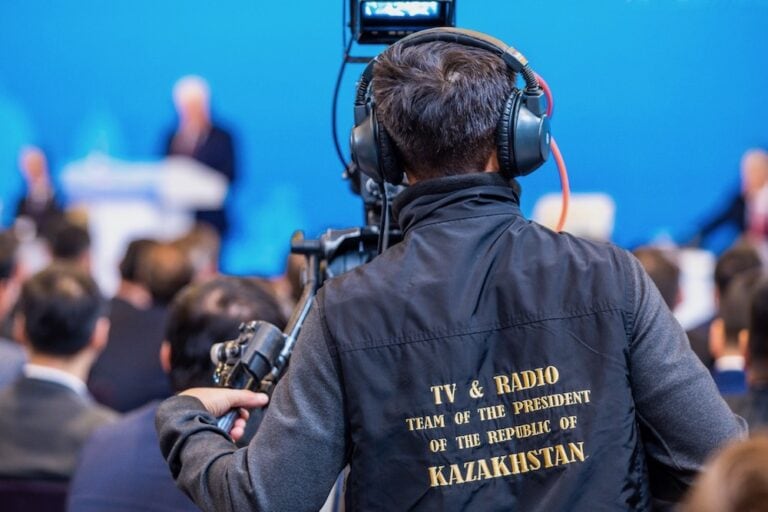Human Rights Watch says the authorities violated Sokolova's right to freedom of expression because she was prosecuted for speaking out on issues such as wage disparity and oil workers' rights.
(Human Rights Watch/IFEX) – Berlin, March 14, 2012 – Conditions imposed on a union lawyer freed from prison by Kazakh authorities on March 7, 2012, prevent her from resuming her labor activism and infringe on her fundamental rights, Human Rights Watch said today. The release of Natalia Sokolova was a positive development, but numerous other activists remain in custody, facing similar criminal charges, Human Rights Watch said.
The charges against Sokolova and the others are based on a legal provision that targets activity that states are obligated to respect and protect under human rights law, Human Rights Watch said. The court found her guilty on charges of “inciting social discord” and “actively participating in illegal gatherings” after she spoke out on issues such as wage disparity and defended oil workers’ rights at companies in western Kazakhstan. Prosecuting Sokolova for addressing trade union members on relevant issues constitutes illegitimate interference with the right to freedom of expression, Human Rights Watch said.
“Sokolova’s reduced sentence is a positive step, but it doesn’t change the fact that she shouldn’t have been prosecuted for union activity in the first place, and that she isn’t allowed to resume her labor activism,” said Mihra Rittmann, Central Asia researcher at Human Rights Watch. “Her conviction set a very dangerous precedent against freedom of expression and association in Kazakhstan.”
The Supreme Court of Kazakhstan on March 6 commuted Natalia Sokolova’s six-year prison sentence, reducing it to a three-year suspended sentence, which allowed her release. Sokolova was freed on March 7, but is barred from “civic” activity and from holding office in a public association – such as a union – for three years. She is subjected to other restrictions as well, such as having to check in regularly with the police.
Sokolova was sentenced on August 8, 2011, by the Aktau City Court. Her initial conviction also included a clause barring her from engaging in “civic” work for three years after she completed her sentence. Her conviction was upheld on appeal on September 26.
The Supreme Court declined on February 20 to review her conviction. But a day later, in an unprecedented development, the prosecutor general contested the terms of Sokolova’s imprisonment, leading to the Supreme Court decision on March 6.
On December 16, several months after Sokolova’s conviction, violent clashes erupted between civilians, including oil workers who had been conducting a peaceful strike for seven months, and police in Zhanaozen, a city in western Kazakhstan. In the following months, authorities in Zhanaozen and Almaty arrested opposition activists and oil workers on criminal charges of “inciting social discord,” which carries a maximum penalty of 12 years in prison.
Nine detained people face these charges. They include several oil workers: Natalia Azhigalieva, who assumed a leadership role throughout the strike; Akzhanat Aminov, who in August had been given a two-year suspended sentence for leading the “illegal” strike by giving orders to workers by phone; Zhanar Saktaganova and Estai Karashaev, each of whom had been attacked by unknown assailants in Zhanaozen in October; Aiman Ungarbaeva, another outspoken oil worker; and Askar Iskanderov.
Opposition activists were arrested on the same charges. At various times after the strike began, each had traveled to Zhanaozen from other cities in Kazakhstan and spoke out publicly in support of the striking oil workers. They include Vladmir Kozlov, leader of the unregistered opposition party Alga!; Aizhangul Amirova, an Alga member who traveled frequently to Zhanaozen to support the oil workers and help raise attention to their demands; and Serik Sapargali. Bolat Atabaev, a member of the opposition movement The People’s Front, and a youth opposition group leader, Zhanbolat Mamai, face the same charges but have not been arrested.
The Kazakhstan National Security Committee (KNB), which is leading the investigation, has forced lawyers representing these oil workers and activists to sign non-disclosure statements. The statements prevent them from sharing any information that constitutes an “investigation secret,” which one opposition activist described to Human Rights Watch as “anything you learn from the investigator.”
Since the criminal investigation into the nine detained oil workers and activists and the two others began, the authorities have not released any evidence of specific speech or actions by the defendants that substantiates allegations that they incited anyone to violence.
In a document dated January 25 issued by the KNB concerning criminal charges against Kozlov, the authorities accuse him of acting “in a group with Amirova and others” and of “commit[ing] deliberate activities, directed at inciting social discord, by distributing literature and other information [that] propagandized social discord, resulting in serious consequences…”
A January 25 prosecutor general’s office statement says that the authorities believe “one of the causes of the mass disorder [on December 16] were the active efforts of some individuals to persuade fired workers to continue their protest action and violently oppose the authorities.” It identifies Kozlov, Amirova, and Sapargali as among those who “incit[ed] social discord.”
On March 13, Atabaev said at a news conference in Almaty that when he was last summoned for questioning by the KNB he was shown the results of an expert linguistic analysis of comments he allegedly made in Zhanaozen. Atabaev said that the analysis did not find evidence of “inciting social discord” in either his or Mamai’s language, but instead found evidence in his language of attempting to overthrow the constitutional order. As yet, no charges related to attempting to overthrow the constitutional order have been brought against either Atabaev or Mamai.
The authorities have not made public the contents of the literature the activists have been accused of distributing, nor have they made available to Human Rights Watch any official information regarding the basis for the charges against the other detainees.
The offense of “inciting social discord,” under article 164 of Kazakhstan’s Criminal Code, is so vague and so broad that it can be and has been used to criminalize lawful behavior protected by human rights law – freedom of opinion, expression, and association, Human Rights Watch said.
The law also offends the principle of legality which, under international human rights law, requires that crimes be classified and described in precise and unambiguous language so that everyone is aware of what acts and omissions will make them liable and can act in accordance with the law.
Laws that target speech that incites violence, discrimination, and hostility must also respect the core right of free speech and are considered compatible with human rights law only when such violence, discrimination, or hostility is imminent and the measures restricting speech are absolutely necessary to prevent such conduct.
Human Rights Watch believes that article 164 of Kazakhstan’s Criminal Code fails to meet the principle of legality or necessity and should be repealed or amended to be compatible with international human rights law.
“Given the secrecy surrounding the investigation and the misuse of this criminal charge against Natalia Sokolova last year, Human Rights Watch is concerned that the authorities are seeking to silence outspoken government critics with the use of vague and overbroad criminal laws,” Rittmann said. “Authorities should stop invoking this legal provision, and the parliament should repeal or amend it so it cannot be abused.”


